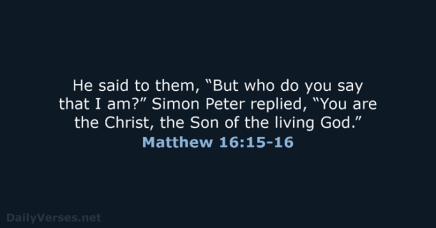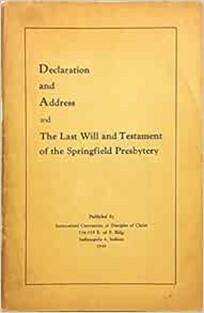Did You Know... Week 2
Did You Know… that the only thing needed to become a member is a confession of faith in Jesus Christ as Savior? Both our primary founders, Alexander Campbell and Barton Stone, believed that the church should structure itself on the practices found in the New Testament. That is, if the New Testament gives evidence of the early Christians doing something, the church of today should do it. Likewise, if there is no evidence of the earliest Christians doing something, we should refrain from doing it today.
When Campbell and Stone looked around, on the western frontier of the United States 200 years ago, they saw people joining other churches (e.g. Lutherans and Presbyterians) on the basis of that church’s creed. A creed is a document that spells out that church’s beliefs. Stone and Campbell were not against the substance of a creed. That is, all creeds said that there was one God and that Jesus Christ was the son of that God. No one would dispute that. But Stone and Campbell felt that the Holy Spirit couldn’t be contained in the words of any one creed. The Holy Spirit cannot be restricted and confined in this way. Moreover, they saw how these creeds were used to divide Christians when, in essence, all Christians believed in Jesus as the way of salvation.

Most important, however, was the fact that when our founders read the New Testament, they didn’t see people coming to Christ by means of a creed or an explanation of their faith. Rather, they were saved by a confession of their faith. They pointed to Matthew 16:16 where Jesus asks the disciples “Who do you say that I am?” Peter replied, “You are the Christ (the savior), the son of the living God.” That was enough for Jesus and it was enough for Campbell and Stone.
As the Christian Church (Disciples of Christ) today, we still base membership on this Great Confession of Peter. We are more concerned that you believe in Jesus as God’s chosen instrument of salvation than we are with in what way you understand him to be simultaneously fully human and fully divine; or with how you think Jesus relates to the other members of the Holy Trinity (Father and Holy Spirit). Should you come forward one Sunday to join the church, we will ask you one question – the same question Jesus asked Peter in Matthew 16:16. We believe this is what God intends – an emphasis on what unites us more than the distinctions of how we articulate our faith, which can divide us.
Blessings – Michael


